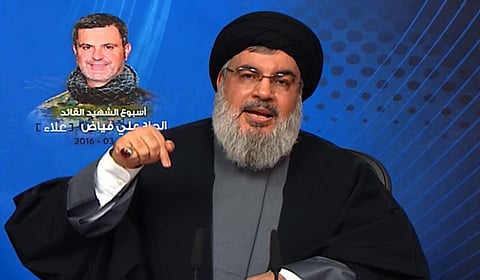Hezbollah is Lebanon’s Achilles heel
The country has been without a president for close to two years and in the absence of a budget is operating on a shoestring

What a difference a decade makes! In the aftermath of the 2006 Hezbollah-Israel War, Hezbollah’s secretary-general Hassan Nasrallah was identified in a trans-Arab poll as the region’s most popular Muslim figure, bathed in a heroic light for standing up against Israel’s military machine using asymmetrical warfare. The fact that Hezbollah’s cross-border abduction of Israeli soldiers triggered the conflict that robbed 1,200 civilians of their lives and destroyed the country’s fragile economy over the coming years tended to be overlooked. Today, Nasrallah is more despised than admired in a region where Hezbollah’s parent, Iran, is viewed by many Arab states as the greatest regional threat.
Setting the long list of terrorist attacks Hezbollah and its affiliates have perpetrated in Lebanon, Saudi Arabia, Argentina and Cyprus, its military involvement in the Syrian conflict on the side of the regime has rendered Lebanon a target. Arguably, its biggest crime is its wielding of military might to place a total stranglehold over the Lebanese political arena and the country’s foreign policy, alienating Beirut’s traditional Arab allies. For Saudi Arabia, Lebanon’s refusal to condemn attacks on Saudi diplomatic missions in Iran in response to the execution of a Shiite cleric was the last straw, evidencing Hezbollah’s grip on the Lebanese government.
The country has been without a president for close to two years and in the absence of a budget is operating on a shoestring even as rivers of garbage blight the landscape and pose a risk to health. This untenable state of affairs has caused some opposition politicians to choose appeasement over their long-held principles ‘for the sake of the country’. In other words, Hezbollah has them over a barrel.
In 2013, an Egyptian court requested Interpol to arrest Hezbollah leaders for conspiring with Hamas and the Muslim Brotherhood to storm prisons during the 2011 revolution. Prosecutors alleged that as many as 800 members of Hezbollah and Hamas had illegally entered Egypt for the purpose of freeing their comrades.
The Gulf Cooperation Council (GCC) states proved they’d had enough with its blacklisting of Hezbollah as a terrorist group some weeks ago. That came on the heels of the Saudi decision to suspend $4 billion that Riyadh had earlier pledged to bolster the Lebanese military and the domestic security services. Gulf nationals have been advised against travelling to Lebanon. The kingdom’s airlines have stopped selling tickets to Beirut.
On Friday, the Arab League also voted to brand Hezbollah terrorist amid “reservations’ expressed by Lebanon and another country under Iranian influence, Iraq. Lebanon’s Foreign Minister Jibran Bassil tweeted,“We voiced reservations because the resolution was not in line with the Arab anti-terror treaty… Hezbollah enjoys wide representation in Lebanon and it is a main component in the country.” Interestingly, despite “reservations”, Lebanon stopped short of objecting to the resolution, no doubt due to concerns about further economic repercussions.
Iraq’s Foreign Minister Ebrahim Al Jaafari spoke in defence of Hezbollah as well as Iraqi Shiite militias, known as Hashd Al Shaabi, saying, they’ve “preserved the dignity of the Arabs, and those who call them terrorists are the terrorists,” eliciting a Saudi walkout. In essence, the Arab world is polarised between states firmly in the Iranian camp, others such as Algeria and Tunisia that have shown their reluctance to take sides and those in the majority determined to block Tehran’s attempts at gaining regional hegemony.
Improved relations
Naturally, Israeli Prime Minister Benjamin Netanyahu is gleeful at this turn of events. Addressing the Knesset he described the GCC’s decision as “very important” and “even amazing”, expressing his belief that countries in the Arab world are beginning to understand that Israel is not their enemy and his hope that improved relations could advance the Israel-Palestine peace process. The Knesset’s Arab Joint List doesn’t agree. Arab lawmakers in the Knesset have rejected Hezbollah’s terror designation as one that endorses Israel’s occupation.
The White House is also less than impressed. Hezbollah and Iran were absent from the US terrorist threat list last year and US President Barack Obama is keen to keep Iran on board the nuclear agreement. As reported in the Wall Street Journal, “Senior US diplomats, including Secretary of State John Kerry, have privately warned Saudi Arabia and the other Gulf states that they were overreacting and risked destabilising Lebanon’s broader economy.”
The problem is how can Saudi Arabia and the Gulf states justify lending their support to Beirut when in effect they are fuelling an Iranian proxy whose grip on the government and the military is unshakeable? Unfortunately, the Lebanese people are caught in the middle and are likely to face further hardships. Nasrallah has always claimed to be Lebanese first. He’s had his day in the sun and now that he’s delivering his country to ruin, he should prove his patriotism by dismantling his militia and bowing out.
Linda S. Heard is an award-winning British political columnist and guest television commentator with a focus on the Middle East.



